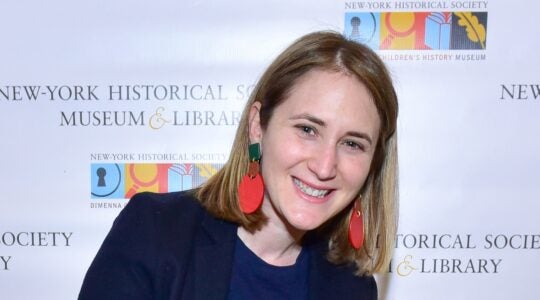Jerusalem — Harris Switzman, a 20-year-old college student from Toronto, said birthright israel — the five-year-old program that has sent more than 70,000 young diaspora Jews on free trips to Israel — is more than a gift. It is a responsibility: to share what he learned in Israel with his friends and family back home and, more importantly, to return frequently to the Jewish state.“The past few days have been so powerful that I can’t comprehend everything I’ve taken in,” Switzman said in an interview at an event Monday that brought about 3,000 birthright participants from 23 countries to the Jerusalem International Convention Center. “What I do know is that I’m coming back, maybe to volunteer, maybe to study. I want to be part of the land, not just see it.
”His words were emblematic of many birthright alumni, about 1,000 of whom are now studying, volunteering, serving in the military or working in Israel, program organizers said. At Monday’s splashy “Mega Event,” which featured song and dance performances and pyrotechnic displays, program funders and organizers, touted birthright, also called Taglit, as a terrific success. They were buoyed by a recent Brandeis University study that showed the transformative impact of the 10-day educational program for Jews ages 18 to 26. The study, undertaken in part by Professor Leonard Saxe, director of the school’s Cohen Center for Modern Jewish Studies, showed that birthright alumni are more inclined to participate in Jewish activities, take Jewish studies courses in college, and return to Israel. “You will change your generation,” philanthropist Charles Bronfman, who has poured millions of dollars into the program, told the cheering group at the Mega Event. “You are building a world in which there is joy in being Jewish and confidence in being Jewish.
”Fellow philanthropist Michael Steinhardt, said, “It’s hard to imagine today’s Jewish world without Taglit.”In her keynote address, an emotional Tzipi Livni, Israel’s Minister of Immigrant Absorption, urged birthright participants to move to Israel. “The future strength of Israel depends not only on our fight against terrorism and our fight against those who don’t accept us in the Middle East,” she said. “It depends on people like you coming not just to visit, but to live here with us.”Enia Krivine, 25, participated in a birthright trip in 2002, and immigrated to Jerusalem a year later. This week, she took part in another birthright trip, this time as an Israeli. “When I came two years ago, I had no plans to move anywhere,” said Krivine in an interview. She is now working towards her master’s degree at Hebrew University. “I had a good job, a home, a dog.
I was in love.”The Phoenix native said her first birthright trip was influential in her decision to make aliyah. Krivine, a secular Jew, acknowledged that the vast majority of participants won’t move to Israel. “I don’t think that’s the important part,” she said. It’s about getting their feet on the ground, bringing them to a place where they have no choice but to ask themselves about their Jewish identity.”Birthright, she said, is bound to have a ripple effect. “The participants, they’ll come back and visit,” she said. “They’ll bring their children.” Maxine Rosenberg, a 20-year-old birthright participant from Albany, said she would not consider moving here but plans to come back often. “Israel is home in my heart, but in reality I couldn’t live here,” she said. “Israelis live on survival and reality, and I live in a little bubble, where everything seems perfect. …I could never fight in a war.” Until recently, Dee Katz, a 19-year-old Israeli birthright participant, considered American Jews spoiled and naïve. “Here I am serving in the army, and I would see my cousins in America, living in big houses, driving new cars, going to college,” Katz said. “My first reaction was ‘You guys don’t even know.’ Now I respect Americans for coming to here, and realize we need them to go back and tell people what Israel is like.” About 70 percent of birthright participants have come from North America.
Program organizers estimate that before the program was launched, about 1,200 Diaspora Jews aged 18 to 26 visited Israel on educational trips annually. In 2004, about 20,000 Jews in that age bracket toured the country with birthright israel. The numbers are even more remarkable, given that the most of the trips have taken place during the current Palestinian uprising. During the last five years, birthright has contributed about $110 million to the Israeli economy, according to program executives.Birthright CEO Shimshon Shoshani said that before birthright was launched, there were few wide-reaching programs that catered young adults. “It’s successful because we’re talking about a target population that nobody was paying attention to,” Shoshani said at the Mega Event.
The vast majority of birthright’s financial backing comes jointly from 14 Jewish philanthropists, the Israeli government and world Jewish agencies, including the federation systems in the United States and Canada. During the first five years, about $150 million was invested in the five-year pilot program. Plans for paying for the program long-term remain uncertain, though organizers said they have secured funding to send about 15,000 young adults to Israel in 2005. “For the past few years Israel has faced an intifada, [an economic] depression and a media offense,” Krivine said. “Birthright is one of the really successful ways we’ve been able to retaliate.”
The New York Jewish Week brings you the stories behind the headlines, keeping you connected to Jewish life in New York. Help sustain the reporting you trust by donating today.




